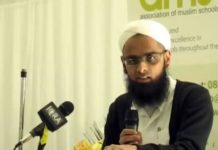Out of the 13 Muslim MPs in Parliament, three voted for air strikes on ISIS in Syria, nine voted against and one abstained.
The government motion passed with an overwhelming majority last night and British fighter jets are already bombing northern Syria
Below is a full list of how the Muslim MPs voted, as well as details of the contributions they made to the Commons debate.
FOR
Nusrat Ghani (Conservative, Wealden)
Ghani told the House: “While it is all very well metaphorically to stand alongside our allies, we make a mockery of solidarity if we refuse to fly alongside them in the skies over Syria. More than that, we make a mockery of our own credibility if we ignore UN Security Council resolution 2249, which has been secured unanimously.
“Having called upon the world community to take action, and given the comprehensive and strategic argument that the Prime Minister has put forward, we cannot ignore that call and expect our international partners to look at us with any shred of respect or good will. How can we ourselves have any self-respect if we leave this fight to brave Kurdish women fighting with antiquated weapons?
Subscribe to our newsletter and stay updated on the latest news and updates from around the Muslim world!
“However, this issue is not all about national pride, living up to our responsibilities or our own self-respect; it is about keeping British people safe – those at risk of being murdered by terrorists and those at risk of being brainwashed into joining them – and we are already doing that…
“According to Oxford University’s Professor Scott Atran, 95% of Daesh recruits are signed up by friends and family, and there are few things more dangerous than misfits who feel they can live outside the law being recruited by the lure of Daesh. It is one of the most barbaric and strategically dangerous enemies we have ever faced.

“Its ability to recruit ordinary westerners, its commitment to transforming them into murderers and suicide bombers, and its lack of mercy to any man, woman or child are unparalleled. It rapes, enslaves and decapitates. Its victims are Muslims, Kurds, Yazidis, Syrian, French and British. Committing acts of atrocity is how it sustains its image of invincibility, and its growth depends on a steady beat of battlefield victories, with looting along the way. It craves headlines that reinforce its apocalyptic propaganda – so much so that the manager of an electronics store in Raqqa said that Daesh loses popularity among ordinary, uneducated people when it loses its brilliant victories. For me, that is at the heart of this argument.
“Tonight’s motion is not just about military intervention, but about humanitarian and diplomatic relations. We must break the umbilical cord that acts as an anchor from Raqqa and offers the seduction of salvation and destruction to the already damaged minds of westerners and middle easterners alike.
“Until we can demonstrate that we can scar and humiliate Daesh, we will not be taken seriously by those who are attracted to doing its bidding. Raqqa is its command and control centre. It is from there that it plans its trilogies of terror: to control parts of Syria and Iraq; to establish wilayats, or provinces, like the ones that have already been declared in Algeria, Libya, Egypt, Nigeria, Syria, Iraq, Saudi Arabia, Yemen, Afghanistan and Pakistan; and, closer to home, to create command and control cells in Europe.
“Caliphates cannot exist as underground movements because they are founded on territorial authority, so to destroy the caliphate and its pull, we must take away its command of territory. To do that we must take military action, because those in Daesh cannot be negotiated with. They are not going to sit at a table and agree a 10-point plan for a political settlement, so the fight has to be taken to them, but I have not met anyone opposed to airstrikes who is willing to go over and negotiate with them. We have nothing they want: they want only our demise..
“As a Muslim woman, I stand with people of all faiths who abhor Daesh’s ideology, rhetoric and actions. We are justified in taking action to destroy them: they are a threat and they will not rest until they have destroyed us and everything we stand for. For that reason, I will vote in favour of the Government’s motion this evening.”
Rehman Chishti (Conservative, Gillingham and Rainham)
Chishti did not speak in the debate.
Sajid Javid (Conservative, Bromsgrove)
Javid did not speak in the debate. It is also unclear whether he identifies himself as a Muslim.
AGAINST
Shabana Mahmood (Labour, Ladywood)
Mahmood told the Commons: “I am a Muslim. Those who know me well know that my belief in God and in my religion is not just a small part of my identity or simply a box that I tick on the census, but the defining characteristic of my life. I am a Sunni too – Sunni born, Sunni raised and, since I have been old enough to make my own mind up about these things, a Sunni by choice.

“Although there is a wide variety of opinion and practice within Sunni Islam, we can all agree that ISIL is not representative of our faith and not representative of Sunni Muslims. They are Nazi-esque totalitarians who are outlaws from Islam, who engage in indiscriminate slaughter and who murder any Muslim who does not agree with them.
“If you are different or if you disagree, you die. I am well aware that under ISIL, a Muslim like myself would be killed, so please believe me when I say that I do not simply want to see ISIL defeated; I want to see it eradicated.
“However, I believe that the proposed action will not work. That is why I cannot vote for it. I fear, primarily, the chaos that might come from a vacuum or ungoverned space. Many Members have said that airstrikes alone will not work, and I agree. We cannot simply bomb the ground; we need a strategy to hold it as well.
“On that point, I have listened carefully to the arguments about the 70,000 moderates. Normally, we believe that our enemy’s enemy is our friend, but in this case I believe that our enemy’s enemy will turn out not to be our friend. There are too many different groups, with too many shifting allegiances and objectives.”
Rushanara Ali (Labour, Bethnal Green and Bow)
Ali voted against but did not speak during the debate.
Yasmin Qureshi (Labour, Bollton South East)
Qureshi told the Commons: “No one voting against the Government’s motion is not bothered about the security of the United Kingdom and the people who live in it. We and our families all live in it. I therefore find the suggestion that those who intend to vote against the motion are terrorist sympathisers or are somehow pacifist extremely insulting.
“As I mentioned earlier, I happened to be in Cairo, Amman and Beirut last week, which is important because the three countries concerned are currently fighting Daesh at their borders. What they have to say about what we in the United Kingdom can do to help fight Daesh needs to be heard in this Chamber.

“First, every single person agrees that extension of the airstrikes into Syria alone will not achieve anything without a massive boots on the ground presence. When I say ‘massive,’ just taking back Raqqa, a city of about half a million people, would need an estimated 40,000 to 50,000 ground troops, along with air support, command and intelligence, headquarters, surveillance and so forth. That is just Raqqa.
“Then there is the challenge of how to hold the territory that has been taken. Unless and until the Prime Minister says that we are going to get those boots on the ground, whether from surrounding Arab countries or the international community, we are not being really serious about containing and destroying Daesh. We need both those strategies.
“Let me make it clear that I have no sympathy with Daesh, because 99% of the people killed by Daesh and Assad are actually Muslims. The slaughter of hundreds of thousands of Muslims is taking place, so I as a Muslim have no truck with Daesh. I would happily support today’s motion if I genuinely believed that it was going to make a dent in Daesh and make the United Kingdom safer, which is an important point.
“With all due respect to the Prime Minister and the Government, what I think is going on here is basically a symbolic gesture to show that we are in the international community and siding with France. Of course we were all devastated by what happened in Paris, but using that as the main reason to extend our involvement is wrong.”
Sadiq Khan (Labour, Tooting)
Sadiq Khan did not speak in the Chamber but prior to the vote told the Evening Standard: “My top priority is keeping Londoners safe. This is a difficult and finely balanced decision, but I’m leaning towards voting against military action on this occasion because the Government haven’t yet convinced me it will make London safer or help weaken, let alone defeat Isil.”
Tasmina Ahmed-Sheikh (SNP, Ochil and South Perthshire)
Ahmed-Sheikh said: “As well as thinking about our own security, we have thought about the security of the people of Syria. Although much of today’s discussion has been about the Government’s motion, and the efficacy or otherwise of military action, there is another important perspective on this catastrophic situation—that of the people of Syria and those in the middle east who have been so deeply and tragically affected by this conflict, and whether adding to the multiple countries already bombing Syria will help them, or indeed our security, at all.”
Imran Hussain (Labour, Bradford East)
Hussain did not make a speech during the debate.
Naz Shah (Labour, Bradford West)
Shah did not speak during the debate.
Tulip Siddiq (Labour, Hampstead and Kilburn)
Siddiq did not speak during the debate.
Rupa Huq (Labour, Ealing Central and Acton)
Huq did not speak during the debate.
ABSTAINED
Khalid Mahmood (Labour Birmingham Perry Barr)
Although he abstained on the vote, Birmingham MP Khalid Mahmood spoke in the debate to criticise the Government’s plan and warned that many of the supposed moderate local fighters were in fact extremists.

He said: “We cannot tackle the terrorists, the ideology and all these people by airstrikes alone. In terms of the case put forward today, I have had the fairly strong view for a long time that we should support action against Daesh, but I am in a quandary at the moment, having heard all the people who have spoken to me, including my constituents and people I have spoken to in this place. I find myself in a very different place at the moment.
“That is because of some of the things that have been said by the Prime Minister. He and the Foreign Secretary have said that under no circumstances will we have any people on the ground. The only way we will defeat this horrid group is by having people on the ground. That means not just us, America, France or others from the EU; we need a coalition of the nations, including the Muslim countries in the area, to deal with this problem.
“We must not think we can deal with it by airstrikes, no matter how accurate our Brimstone missiles are, and no matter how many strikes and sorties we can carry out. If we are able to wage that war from the air and defeat Daesh, there is a bigger issue: consistently, on the issue of terrorism and radicalisation, we have managed to jump out of the frying pan and into the fire.






















